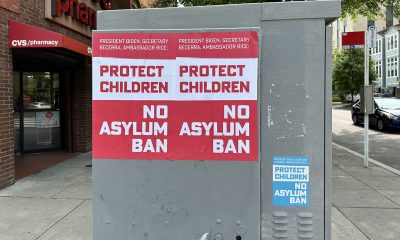National
Bi-national couples in ‘surreal’ wait for DOMA decision
150 attorneys in training to assist when ruling comes


Heather (left) and Maria “Mar” del Mar have already filed their I-130 applications in anticipating of a ruling against DOMA. (Photo courtesy of Immigration Equality)
After being together for five years, Heather and Maria “Mar” del Mar are making their final preparations in anticipation of a ruling from the Supreme Court that could mean they can stay together in the United States.
Heather, a U.S. citizen, and Mar, a Spanish national, have already completed their I-130 marriage-based green card application and have sent it to the LGBT group Immigration Equality with the expectation that the high court will strike down the Defense of Marriage Act.
“We’re actually largely done with that,” Heather said. “Our intention on that front is, of course, to file that petition the first day it’s legally viable to do so.”
Although Mar has legal status because she’s living in the United States on a work visa, it expires in November. Section 3 of DOMA, which prohibits federal recognition of same-sex marriage, has blocked the New York City couple, who married in 2011, from a more permanent solution.
In March of last year, U.S. Customs & Immigration Enforcement denied Heather and Maria a marriage-based green card based on an earlier application, citing DOMA as the reason. They’re one of the estimated 28,500 bi-national same-sex couples in danger of separation.
That could change in the coming days. The Supreme Court is expected to deliver a ruling on the constitutionality of DOMA as a result of pending litigation along with ruling in a separate case challenging California’s Proposition 8.
If the court rules DOMA is unconstitutional, blocking the U.S. government from enforcing it, USCIS will have no legal reason to withhold the marriage-based green card from Heather and Mar.
Heather, a marketing director for a global non-profit organization in New York, said the wait for the decision has been “kind of surreal” and what’s been on the couple’s minds in the days heading to the ruling.
“We look at each other every night before we go to bed I would say for the last few weeks, where it’s been kind of like a month countdown, and we’ve said, “Oh my God, what is it going to really be like the day after?” she said. “How much is our life going to change when this issue isn’t a huge weight on our relationship and even on our everyday thought process.”
Mar, who works in marketing for a Spanish-language newspaper in New York, said a ruling against DOMA would lift a considerable burden because they are unable to plan for the future as they fear separation.
“We are really nervous because this would be a big change in our life,” Mar said. “We are very excited.”
As of today, the Supreme Court calendar designates only June 20 and June 24 as days on which opinions will be handed down; But with 14 cases yet to be decided, it is widely expected that they will add another day to the calendar, either June 26 or June 27 and the decisions for the marriage will be announced at that time.
And Heather and Mar, who are among the plaintiffs in Immigration Equality’s lawsuit against DOMA, already have plans. On the last Saturday of the month, they’re inviting friends and family to come to their home to celebrate the moment when the federal government will view their relationship as legally equal to others.
“We actually already have — I guess this is probably superstitious; I shouldn’t say this out loud — but we actually already have a celebration planned for family and friends — we have to be optimistic — for Saturday night on the 29th,” Heather said. “So, we’re celebrating at our place.”
And what if the Supreme Court rules in favor of DOMA? Heather said it’s not an outcome they like to consider, but in that event, they’d pursue additional litigation, find a way to renew Mar’s work visa and push for the inclusion of gay couples in comprehensive immigration reform legislation.
“To be honest, it will just be devastating; all of those things are just technically the things that we’ll do,” Heather said. “I’ll tell you what we’re going to do; we’re going to start a family anyway because we refuse to live at the effect of our circumstances. We’ve already postponed things in our life much more than is fair — and we’ll consider the option of moving to Spain where our marriage is recognized.”
But Heather and Mar are just one of many bi-national same-sex couples readying for a Supreme Court ruling that would ensure they can stay together in the United States.
Rachel Tiven, executive director of Immigration Equality, said she’s expecting thousands of green card applications from bi-national same-sex couples in the months following a court ruling against DOMA.
“We think that there will be over the first year many thousands,” Tiven said. “I think in the remaining five months of the year, we’ll see something between 2,000 and 10,000 applications, but that’s a guess.”
In the meantime, Tiven said her organization is already preparing some applications for same-sex bi-national couples and making plans for others to renew applications that were previously denied.
“We’re preparing some families who will file immediately if the Supreme Court will enable them to do so,” Tiven said. “Other families who filed a long time ago — either because they were plaintiffs, or because it was a step to seeking deferred action — we are asking the administration, for those who were denied, we’re asking the administration to reopen those applications so they don’t have to file all over again, and don’t have to pay the fee again.”
In order to facilitate the expected increase in couples filing marriage-based green card applications, Immigration Equality’s legal team has conducted two trainings last week for attorneys who have signed up to assist couples with their petitions following a court ruling striking down Section 3 of DOMA.
Steve Ralls, a spokesperson for Immigration Equality, said 150 lawyers from across the country to date have joined that network of attorneys and have taken part in one of those two trainings.
“As part of that training, our legal team discussed topics related to identifying issues that may arise for same-sex bi-national couples during implementation following the court’s ruling,” Ralls said. “A key goal is to ensure that attorneys working with LGBT families can also serve as watchdogs during that critical implementation period and report any issues they encounter with relevant government agencies in their processing of green card applications for affected families.”
Another couple making preparations in anticipation of a court ruling is Rachel Wilkins and Jennifer Blum, a New Jersey couple that married a year-and-a-half ago. Blum, a New Jersey native, is awaiting the opportunity to sponsor Wilkins, a British national, for residency in the United States.
The couple has never filed a marriage-based green card application before, but Blum, an attorney, said they’ve already hired an attorney to help them through the process in anticipation of a ruling against DOMA.
“We’ve hired an attorney to prepare our application for us,” Blum said. “So we’ve been really just trying to get all the paperwork together, and we’re excited for this decision to finally come to fruition, and we just want to move on with our lives.”
Wilkins, a curator who’s in the country on work visa, said she shares a sense of optimism that the Supreme Court will issue a decision that renders Section 3 of the the Defense of Marriage Act inoperable.
“I think we’re feeling optimistic,” Wilkins said. “We were watching the Supreme Court blog to see the orders handed down just waiting to see the right decision made.”
The couple came to D.C. when the oral arguments took place at the Supreme Court in March and had the opportunity to meet lesbian New Yorker Edith Windsor, who filed the lawsuit that’s currently before the court.
“We walked up on the steps and I lost it … because it’s just the culmination of so many people’s hard work, sweat, they’ve given so much to be able to get to this point where we could get this case in front of the Supreme Court, and for the Supreme Court to finally do the right thing, and for justice to be done,” Blum said.
Should the court strike down DOMA, Blum said they’ll celebrate by gathering at the Stonewall Inn in New York City, where riots began in 1969 that were considered the start of the modern gay rights movement.
“Legally, factually, I just can’t see the Supreme Court determining any other way,” Blum said. “Like I said, there’s no other option.”
Lavi Soloway, a gay immigration attorney at Masliah & Soloway and co-founder of The DOMA Project, said his firm worked for several months on preparing to file new marriage-based green card applications — some on the day the court issues a decision against DOMA — and has several filed in 2011 and 2012 that haven’t yet been denied.
“The couples have undertaken the preparation with the understanding that that the Supreme Court ruling on DOMA is not something that we can predict in advance, but it would be fair to say that their perspective, like mine, is cautiously optimistic,” Soloway said.
CORRECTION: An earlier version of this article misattributed quotes to Jennifer Blum and Rachel Wilkins. The Blade regrets the error.
State Department
State Department releases annual human rights report
Antony Blinken reiterates criticism of Uganda’s Anti-Homosexuality Act

Secretary of State Antony Blinken on Monday once again reiterated his criticism of Uganda’s Anti-Homosexuality Act upon release of the State Department’s annual human rights report.
“This year’s report also captures human rights abuses against members of vulnerable communities,” he told reporters. “In Afghanistan, the Taliban have limited work opportunities for women, shuttered institutions found educating girls, and increasing floggings for women and men accused of, quote, ‘immoral behavior,’ end quote. Uganda passed a draconian and discriminatory Anti-Homosexuality Act, threatening LGBTQI+ individuals with life imprisonment, even death, simply for being with the person they loved.”
Ugandan President Yoweri Museveni last May signed the law, which contains a death penalty provision for “aggravated homosexuality.”
The U.S. subsequently imposed visa restrictions on Ugandan officials and removed the country from a program that allows sub-Saharan African countries to trade duty-free with the U.S. The World Bank Group also announced the suspension of new loans to Uganda.
Uganda’s Constitutional Court earlier this month refused to “nullify the Anti-Homosexuality Act in its totality.” More than a dozen Ugandan LGBTQ activists have appealed the ruling.
Clare Byarugaba of Chapter Four Uganda, a Ugandan LGBTQ rights group, on Monday met with National Security Council Chief-of-Staff Curtis Ried. Jay Gilliam, the senior LGBTQI+ coordinator for the U.S. Agency for International Development, in February traveled to Uganda and met with LGBTQ activists who discussed the Anti-Homosexuality Act’s impact.
“LGBTQI+ activists reported police arrested numerous individuals on the basis of their sexual orientation or gender identity and subjected many to forced anal exams, a medically discredited practice with no evidentiary value that was considered a form of cruel, inhuman, and degrading treatment and could amount to torture,” reads the human rights report.
The report, among other things, also notes Ugandan human rights activists “reported numerous instances of state and non-state actor violence and harassment against LGBTQI+ persons and noted authorities did not adequately investigate the cases.”
Report highlights anti-LGBTQ crackdowns in Ghana, Hungary, Russia
Ghanaian lawmakers on Feb. 28 approved the Promotion of Proper Human Sexual Rights and Ghanaian Family Values Bill. The country’s president, Nana Akufo-Addo, has said he will not sign the measure until the Ghanaian Supreme Court rules on whether it is constitutional or not.
The human rights report notes “laws criminalizing consensual same-sex sexual conduct between adults” and “crimes involving violence or threats of violence targeting lesbian, gay, bisexual, transgender, queer or intersex persons” are among the “significant human rights issues” in Ghana.
The report documents Hungarian Prime Minister Viktor Orbán and members of his right-wing Fidesz party’s continued rhetoric against “gender ideology.” It also notes Russia’s ongoing crackdown against LGBTQ people that includes reports of “state actors committed violence against LGBTQI+ individuals based on their sexual orientation or gender identity, particularly in Chechnya.”
The report specifically notes Russian President Vladimir Putin on July 24 signed a law that bans “legal gender recognition, medical interventions aimed at changing the sex of a person, and gender-affirming care.” It also points out Papua New Guinea is among the countries in which consensual same-sex sexual relations remain criminalized.

The Cook Islands and Mauritius in decriminalized homosexuality in 2023.
The report notes the Namibia Supreme Court last May ruled the country must recognize same-sex marriages legally performed outside the country. The report also highlights the Indian Supreme Court’s ruling against marriage equality that it issued last October. (It later announced it would consider an appeal of the decision.)
Congress requires the State Department to release a human rights report each year.
The Biden-Harris administration in 2021 released a memorandum that committed the U.S. to promoting LGBTQ+ and intersex rights abroad.
The full report can be read here.
National
Same-sex couples vulnerable to adverse effects of climate change
Williams Institute report based on Census, federal agencies

A new report by the Williams Institute at the UCLA School of Law finds that same-sex couples are at greater risk of experiencing the adverse effects of climate change compared to different-sex couples.
LGBTQ people in same-sex couple households disproportionately live in coastal areas and cities and areas with poorer infrastructure and less access to resources, making them more vulnerable to climate hazards.
Using U.S. Census data and climate risk assessment data from NASA and the Federal Emergency Management Agency, researchers conducted a geographic analysis to assess the climate risk impacting same-sex couples. NASA’s risk assessment focuses on changes to meteorological patterns, infrastructure and built environment, and the presence of at-risk populations. FEMA’s assessment focuses on changes in the occurrence of severe weather events, accounting for at-risk populations, the availability of services, and access to resources.
Results show counties with a higher proportion of same-sex couples are, on average, at increased risk from environmental, infrastructure, and social vulnerabilities due to climate change.
“Given the disparate impact of climate change on LGBTQ populations, climate change policies, including disaster preparedness, response, and recovery plans, must address the specific needs and vulnerabilities facing LGBTQ people,” said study co-author Ari Shaw, senior fellow and director of international programs at the Williams Institute. “Policies should focus on mitigating discriminatory housing and urban development practices, making shelters safe spaces for LGBT people, and ensuring that relief aid reaches displaced LGBTQ individuals and families.”
“Factors underlying the geographic vulnerability are crucial to understanding why same-sex couples are threatened by climate change and whether the findings in our study apply to the broader LGBTQ population,” said study co-author Lindsay Mahowald, research data analyst at the Williams Institute. “More research is needed to examine how disparities in housing, employment, and health care among LGBT people compound the geographic vulnerabilities to climate change.”
Read the report
Federal Government
Lambda Legal praises Biden-Harris administration’s finalized Title IX regulations
New rules to take effect Aug. 1

The Biden-Harris administration’s revised Title IX policy “protects LGBTQ+ students from discrimination and other abuse,” Lambda Legal said in a statement praising the U.S. Department of Education’s issuance of the final rule on Friday.
Slated to take effect on Aug. 1, the new regulations constitute an expansion of the 1972 Title IX civil rights law, which prohibits sex-based discrimination in education programs that receive federal funding.
Pursuant to the U.S. Supreme Court’s ruling in the landmark 2020 Bostock v. Clayton County case, the department’s revised policy clarifies that discrimination on the basis of sexual orientation and gender identity constitutes sex-based discrimination as defined under the law.
“These regulations make it crystal clear that everyone can access schools that are safe, welcoming and that respect their rights,” Education Secretary Miguel Cardona said during a call with reporters on Thursday.
While the new rule does not provide guidance on whether schools must allow transgender students to play on sports teams corresponding with their gender identity to comply with Title IX, the question is addressed in a separate rule proposed by the agency in April.
The administration’s new policy also reverses some Trump-era Title IX rules governing how schools must respond to reports of sexual harassment and sexual assault, which were widely seen as imbalanced in favor of the accused.
Jennifer Klein, the director of the White House Gender Policy Council, said during Thursday’s call that the department sought to strike a balance with respect to these issues, “reaffirming our longstanding commitment to fundamental fairness.”
“We applaud the Biden administration’s action to rescind the legally unsound, cruel, and dangerous sexual harassment and assault rule of the previous administration,” Lambda Legal Nonbinary and Transgender Rights Project Director Sasha Buchert said in the group’s statement on Friday.
“Today’s rule instead appropriately underscores that Title IX’s civil rights protections clearly cover LGBTQ+ students, as well as survivors and pregnant and parenting students across race and gender identity,” she said. “Schools must be places where students can learn and thrive free of harassment, discrimination, and other abuse.”
-

 South America4 days ago
South America4 days agoDaniel Zamudio murderer’s parole request denied
-

 Maryland5 days ago
Maryland5 days agoMontgomery County police chief discusses arrest of trans student charged with planned school shooting
-

 Commentary5 days ago
Commentary5 days agoWorld ‘isn’t much different today’
-

 State Department21 hours ago
State Department21 hours agoState Department releases annual human rights report









